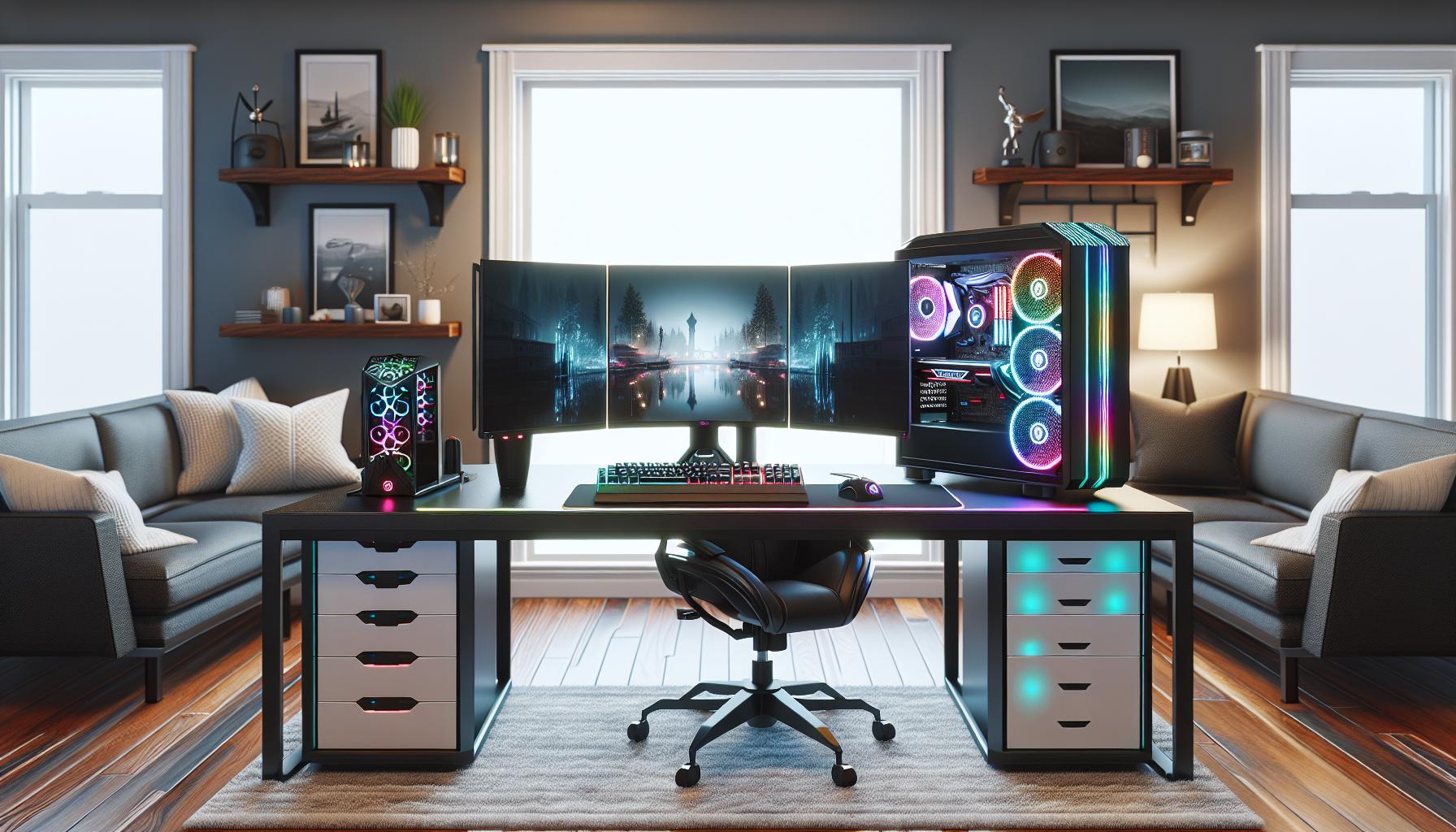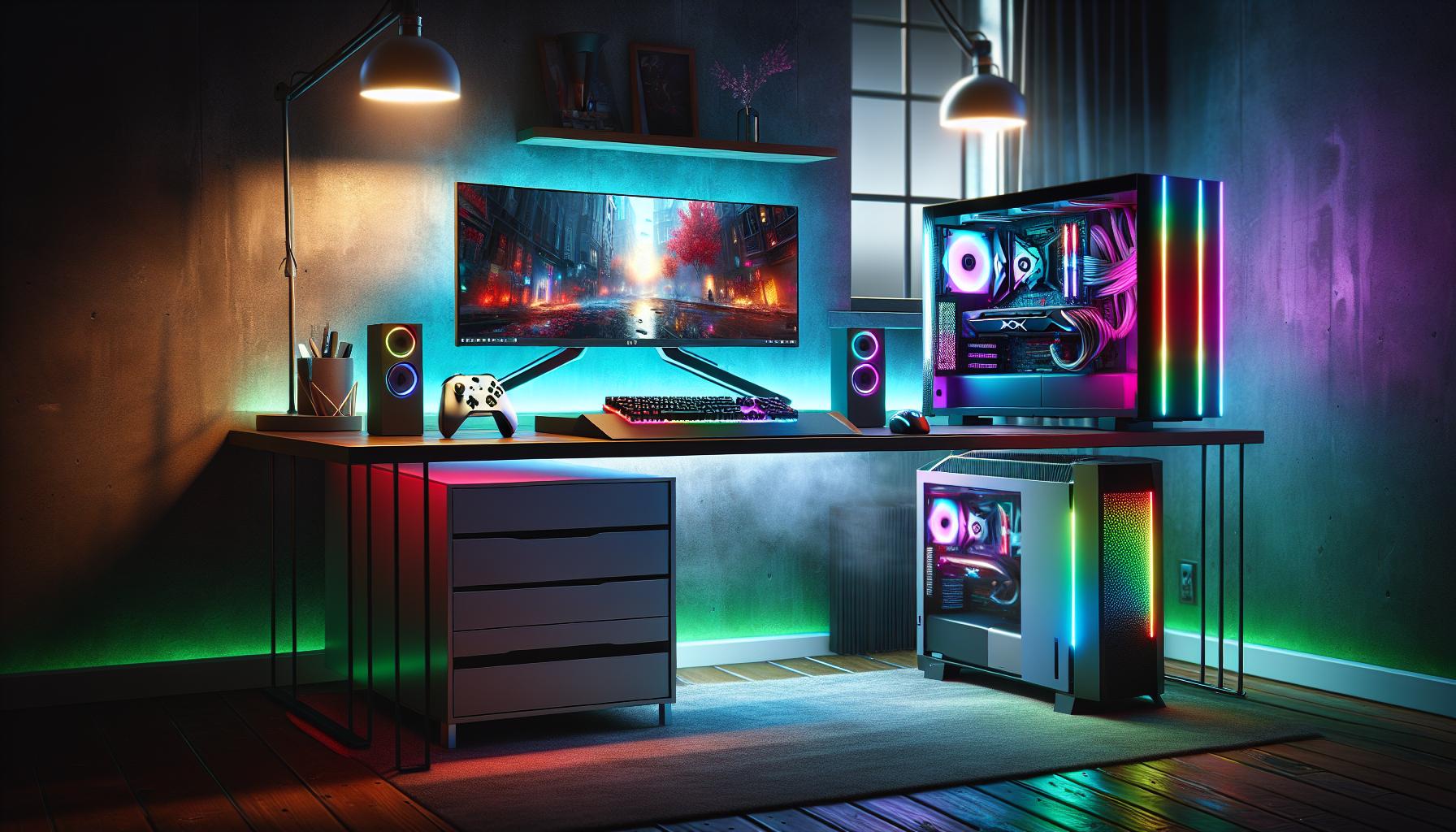Phone:
(701)814-6992
Physical address:
6296 Donnelly Plaza
Ratkeville, Bahamas.

In the epic showdown of gaming platforms, PC and console enthusiasts often find themselves locked in a battle for supremacy. Each side boasts its own fanatics, armed with powerful arguments and a few friendly jabs. But when it comes to the ultimate question—Is PC gaming better than console?—the debate heats up faster than a gamer’s keyboard during a boss fight.
PC gaming offers customization, breathtaking graphics, and a vast library of games, while consoles promise simplicity and a cozy living room experience. It’s like comparing a Swiss Army knife to a trusty old hammer; both have their merits, but only one can slice through the competition. So, grab your snacks and settle in as we dive into the nitty-gritty of this gaming rivalry, where pixels and performance collide in the quest for the ultimate gaming experience.
PC gaming offers a highly customizable experience. Gamers can upgrade hardware components, including graphics cards and processors, to enhance performance. A diverse game library attracts gamers to PC, including independent titles and multiple genres.
Console gaming emphasizes ease of use and convenience. Plug-and-play functionality caters to those who prefer minimal setup time. Popular consoles, such as PlayStation and Xbox, offer strong exclusive titles that appeal to a broad audience.
Graphics quality in PC gaming typically surpasses that of consoles. Higher resolutions and frame rates elevate the gaming experience. Advanced settings and mods further enrich gameplay options on PC.
Cost considerations impact the choice between PC and console. A gaming PC can require a larger initial investment compared to consoles. However, the lifespan of a gaming PC often extends due to upgrade capabilities.
Online services differ between the two platforms. PC gamers enjoy platforms like Steam, which frequently offer discounts on titles. Console gamers utilize services like PlayStation Plus and Xbox Game Pass, providing access to a rotating selection of games.
Social interactions and communities thrive on both platforms. Voice chat systems on PC create opportunities for teamwork. Likewise, consoles foster friendships through shared gaming sessions.
In terms of control schemes, PC gaming supports a wide variety of peripherals. Keyboards and mice can enhance precision, especially in competitive games. Consoles rely on standardized controllers, which provide a more uniform experience across titles.
Overall, preferences for PC or console gaming depend on individual priorities. Gamers who value performance and depth may lean towards PCs. Those who prioritize ease of access and exclusive content might prefer consoles.

PC gaming typically leads in graphics quality, delivering stunning visuals that often exceed console capabilities. Higher resolutions, like 4K, are easily supported on gaming PCs. Advanced settings allow gamers to fine-tune their experience, adjusting textures and lighting effects for realism. Mods further enhance visual fidelity, adding depth to gameplay. Console graphics, while impressive, generally remain fixed due to hardware limitations.
Frame rates also show a distinct advantage for PCs, allowing for smoother gameplay with higher refresh rates. Many gaming monitors support up to 240Hz, promoting fluid motion even in fast-paced scenarios. On consoles, frame rates usually cap at 30 or 60 FPS due to hardware constraints. Competitive gamers often prefer PCs for this reason, as the higher frame rates can provide a slight edge during intense matches. Overall, these performance metrics generally highlight why many gamers favor the PC platform.

Cost plays a crucial role in the PC versus console gaming debate. Understanding both initial investments and long-term expenses aids in making informed decisions.
PC gaming necessitates a higher initial investment compared to consoles. A decent gaming PC typically starts at around $800, while consoles like the PlayStation 5 or Xbox Series X range from $500 to $600. Upgrading components can incur additional costs, such as graphics cards and RAM, leading to a total expenditure exceeding $1,000 for a competitive setup. Consoles provide affordability through a one-time purchase, often including a bundled controller. This simplicity attracts budget-conscious gamers. However, customization options available in PC gaming allow for tailored experiences, appealing to enthusiasts who prioritize performance and aesthetic preferences.
Long-term expenses differ significantly between the two platforms. PC gamers might experience higher maintenance costs due to component upgrades and potential repairs. Annual upgrades can reach $300 to $500, depending on performance needs. In contrast, console owners typically face fewer ongoing costs. Subscription services like PlayStation Plus or Xbox Game Pass can add $60 to $120 annually for online play and game libraries. Exclusive titles may also require additional purchases but often remain less frequent than continuous PC upgrades. Over time, this difference in upkeep can affect overall expense evaluation, with each platform presenting a unique financial commitment.
Game libraries and availability play a significant role in the PC versus console debate. The variety and access of games can significantly impact user experience.
Both PC and consoles feature unique exclusive games. Consoles like PlayStation and Xbox frequently host compelling titles, such as “The Last of Us” and “Halo.” These exclusives draw players to their respective platforms. PC gamers, however, benefit from a plethora of independent titles that often see early releases or exclusive bundles. Many of these indie games bring innovation to the gaming landscape. Larger franchises also release on PC, giving players access to popular titles like “Counter-Strike” or “Dota 2.” This extensive array of exclusive titles makes for a diverse gaming experience across platforms.
Backward compatibility can influence a player’s choice between PC and console gaming. Consoles typically offer limited backward compatibility, allowing access to only select older titles. PlayStation and Xbox have made strides in this area, but players still encounter many unavailable games. PCs, in contrast, provide extensive backward compatibility. Most PC games support earlier versions, making it easier for players to revisit classics. Technical adjustments, like running emulators, often enable access to old games on PCs. This superior compatibility can enhance the longevity of a gaming library on PC, engaging players for an extended period.
User experience significantly shapes the choice between PC and console gaming. Each platform offers distinct advantages that cater to different preferences and gameplay styles.
PC gaming allows players to customize hardware extensively. Upgrades can include graphics cards, processors, and cooling systems, enhancing performance based on personal preferences. Various peripherals like mechanical keyboards and gaming mice contribute to a tailored setup. Gamers seeking higher frame rates or improved graphics can adjust settings to suit their needs. Customization doesn’t just end with hardware; software modifications and mods provide further enhancements to gameplay. Ultimately, these options support a unique gaming experience catering to individual tastes.
Console gaming provides a straightforward experience with plug-and-play functionality. Setting up a console takes minimal time, making it accessible for gamers of all skill levels. Friendly interfaces and intuitive designs reduce barriers to entry, so even casual gamers can dive into their favorite titles quickly. Exclusive games releases often garner attention, emphasizing the appeal of jump-in-and-play convenience. Regular software updates maintain smooth operation, ensuring the system runs optimally. Together, these aspects establish consoles as user-friendly platforms that prioritize ease for players focused on enjoyment.
Social interactions play a significant role in gaming, with both PC and console platforms offering distinct experiences.
Online multiplayer experiences differ between PC and console gaming. PC gaming often excels with support for larger player counts and complex matchmaking systems. Games like “League of Legends” or “Fortnite” showcase seamless integration and frequent updates. Console gaming emphasizes local multiplayer, encouraging couch co-op sessions. Exclusive titles such as “Super Smash Bros.” foster competitive environments, inviting friends to gather and play together. Player bases on each platform vary. Communities on PC might engage in forums to strategize or share tips. Console gamers often partake in organized events, enhancing their social involvement.
Online communities thrive across both platforms, yet their dynamics vary. PC gamers frequently connect through platforms like Discord, discussing strategies or forming teams. This fosters camaraderie among players who may not be physically nearby. Console users often rely on built-in social features for easy communication, allowing for quick connections between friends. Exclusive content and updates spark buzz, with communities rallying around new announcements. Both environments provide unique opportunities for friendship and collaboration, highlighting the strengths of social interaction within gaming. Players adapt to their preferred platform’s landscape, enriching their overall experience through community ties.
The debate between PC gaming and console gaming continues to spark passionate discussions among enthusiasts. Each platform brings unique strengths that cater to different preferences and play styles. While PC gaming offers unparalleled customization and superior graphics, console gaming excels in simplicity and exclusive titles.
Ultimately, the choice hinges on individual priorities. Gamers seeking a tailored experience with a vast library may lean towards PCs, while those valuing convenience and accessibility might prefer consoles. Understanding these differences helps gamers make informed decisions that align with their gaming lifestyle.